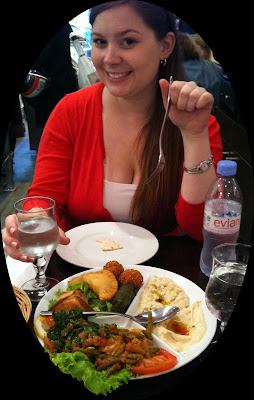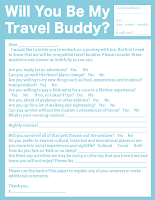Traveling with Diet Restrictions
 |
| That way you can be as happy as I am in this picture enjoying a Mediterranean feast in Paris. |
2. Look up local dishes you can eat before you go. A simple Google search will give you tons of food options you can find when visiting other countries. Memorize or write down the names of the dishes so you can order it when you see it.
3. Take it one step further and look up local restaurants. If you know where you will be staying or visiting, look up restaurants that offer what you are looking for. Write down addresses and check them out while you're there. You'll have confidence knowing you will find at least one thing you can eat.
4. When flying, call the airline ahead of time. Tell them when your flight is and what your diet restrictions are. Usually airlines have at least a vegetarian option, but if you have more restrictions they can usually accommodate your needs.
5. Have a guidebook that includes food translations. Chances are you will be able to find something you can eat, but it doesn't help if you have no idea what the menu says. Some restaurants will provide an English menu, but not all of them do. Bring your own travel-sized guidebook that includes not only phrases, but translations for names of common foods.
6. Ask for help. Tell your waiter what your restrictions are and they may be able to help. Recently on my trip to Greece, one of our fellow travelers could only eat gluten-free. She spoke with one of the managers and he was happy to provide her with gluten-free meals on the cruise ship each day. If their business is hospitality, most of the time hotels, cruise ships and restaurants are happy to accommodate your needs.
7. Learn how to ask "Is there meat/dairy/gluten/etc. in this?" in the local language. A language barrier can make ordering food difficult, so also learn "yes" and "no" in that language. Chances are someone will be able to speak English to answer your questions, but it doesn't hurt to know some of the language.
8. Bring snacks. If you really can't find anything you can eat, have a backup plan. Protein bars, granola bars, trail mix or whatever snacks you indulge in at home will keep your energy up and keep you from focusing on the lack of food you can enjoy. Don't ruin your trip because you're cranky and hungry (AKA hangry).
9. Cook your own food. If you are at a homestay, have a hotel room with a kitchen or have any other access to a kitchen, stop by the local grocery store and prepare your own meals. That way you know exactly what is going into your food and you won't starve.
10. Don't insult the chef. Again, if you are at a homestay or somewhere else where someone has prepared a meal you did not choose, you may have to graciously decline. Emphasis on graciously. In some cultures it is a huge insult to not eat what you are given. While I would recommend trying anything new, despite what it may look like, it is not worth risking your health if you think it will actually make you sick. Try to explain the circumstances of why you cannot eat what you have been given and thank them for the time and effort they put into preparing it. If they provide you with another meal you can eat, you better eat the whole thing and say thank you, a lot.
11. Bring your meds. If there is a medication that will stop you from blowing up like a balloon after eating something you are allergic to or stop the nausea and other symptoms that come with eating something you shouldn't have, for the love of God, bring that medicine! Even when you are careful, eating things your body isn't used to can cause some adverse effects. I have developed some stomach issues in my old age and now I don't go too far from home without some kind of medicines to put an upset stomach to rest. (We're getting really personal here.) So don't be ashamed of whatever it is you need to make you feel better, you'll be happy you have it when you need it. And you may be someone else's lifesaver if they traveled without it.
If anyone with diet restrictions has other recommendations for making traveling easier, leave them in the comments below and I will be sure to include them! Don't feel limited by what you can or can't eat, there are options out there for everyone. Check out the Pinterest board for this post for more tips and find out what cities are the most gluten-free, vegan or vegetarian-friendly.
Edit: Thank you to Jayme and Zoe who told me about two helpful sites I didn't know about! Check out Allerglobal where you can make and print an allergy card in any language and Vegan Passport which explains what vegans can and cannot eat in 73 languages! Awesome tips guys!
Edit: Thank you to Jayme and Zoe who told me about two helpful sites I didn't know about! Check out Allerglobal where you can make and print an allergy card in any language and Vegan Passport which explains what vegans can and cannot eat in 73 languages! Awesome tips guys!
Fun Fact: The fact today is also food-related and I get to show off that Art History minor I completed and tend to forget about. The Medicis were a wealthy and influential family in Florence from the 14th to 18th Century. The Medicis were prolific art collectors and often commissioned paintings by well-known artists. If you look at Italian Renaissance paintings of the time and notice oranges prominently displayed in the composition, that piece was probably commissioned by the Medici family. Oranges came to represent the family because they symbolized wealth and fertility and also because they closely resembled the red balls found on the Medici family crest. One well-known painting commissioned for a Medici wedding is Botticelli's Primavera. It depicts Roman Gods standing in an orange grove and represents beauty, fertility and love, all the things you want in a marriage.
I hope you enjoyed this post and hopefully it will help anyone who was feeling discouraged about traveling with their diet restrictions. Leave any questions, comments, recipes, whatever in the comments below!
Thanks for reading!
-Sam

assuming that the people who you will be communicating with know how to read (and I don't mean that sarcastically I am being completely serious) -- this is something that could also be helpful if you aren't familiar with the language
ReplyDeletehttp://www.vegetarianguides.co.uk/products/veganpassport.shtml
great post!